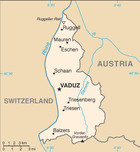Browse All Liechtensteiner Recipes: Liechtensteiner Appetizers | Liechtensteiner Beverages | Liechtensteiner Soups | Liechtensteiner Salads | Liechtensteiner Vegetarian | Liechtensteiner Meat Dishes | Liechtensteiner Snacks | Liechtensteiner Desserts

|
This article is a stub! This article doesn't contain enough information. If you know anything about Liechtensteiner Cuisine, please add to this article!
|
Liechtenstein - Cooking and Food
Overview of Liechtensteiner Cuisine History
The Principality of Liechtenstein is situated in Central Europe between Switzerland in the west and Austria in the east. Liechtensteiner cuisine is influenced by its neighbors' cuisines, that’s what makes Liechtensteiner cuisine diverse. However Liechtensteiner cuisine is very similar to French and Swiss cuisines. Liechtensteiner main dishes include small dumplings with cheese, brawn and ribel grain. In Liechtensteiner cuisine can be found a large variety of cheese dishes and the main ingredients of a local dish is cheese, meat and vegetables. As for meat people from Liechtensteiner prefer pork meat and pork products such as smoked bacon or ham and schnitzels. There are numerous Liechtensteiner recipes adapted after French cuisine which require special ingredients such as cinnamon, vanilla, tomatoes, green beans, béchamel and velout. There is also a large variety of fruits and vegetables used in Liechtenstein like tomatoes, potatoes, onions, garlic, olives, pears, apples and you can find as well various recipes for omelets.
Cuisines of Liechtenstein

Map of Liechtenstein - Click to enlarge
Traditional Liechtensteiner meals include cheese, meat and bread. A main source of diet is Rebi made with cornmeal or a mixture of half cornmeal and half semolina and usually served with the main dish. Because French influences were very well adapted in Liechtensteiner cuisine cheese remained an important ingredient mostly if it’s cooked after local recipes as Saukerkas, a local cheese. Other original dishes include Hafalaab, a dish made from wheat flour and cornmeal dumplings, with smoked Bacon or Ham in a broth. As well schnitzels, smoked Pork and sauerkraut stews; cheese, meat, vegetable fondues, as asparagus which is one of the most popular vegetable, and a number of delicious deserts such as fruit-filled pancakes, rich pastries and cakes are some of the delicious Liechtensteiner recipes which make its cuisine very interesting and very tasty. Although there are numerous recipes adapted after main central European cuisine, Liechtensteiner cuisine is seems to be original and mouth watering.
Preparation Methods for Liechtensteiner Cooking
Liechtensteiner cuisine uses elements from various cooking traditions borrowed from their neighbors and developed from their own traditional dishes. While there are no specific or unique preparation methods for Liechtensteiner cooking, we should point out that attention to detail is important in the Liechtensteiner cuisine. Using the right amount of spices for example is essential – either for spicing up the taste or for coloring the dish. The diversity of vegetables and cereals found in Liechtenstein is also noticed in the delicious dishes belonging to their cuisine. The visual attractiveness of the dish is also important, and a balance between colors and proportion differentiates. Each traditional dish has a special cooking method, which is more or less general in all of Liechtenstein's regions. Meat is one of the main elements of most Liechtensteiner dishes and cured and smoked hams are often parts of delicious dishes.
Special Equipment for Liechtensteiner Cooking
Ranging from cake pans, can openers, colanders, egg rings, poachers and holders, food dishers and portioners, food pans and food containers to other kitchen utensils, such as food scales, food scoops and fryer baskets and accessories, the Liechtensteiner cuisine needs a diverse cooking equipment set in order to produce the most sophisticated Liechtensteiner dishes. You should consider insulated food carriers if you are transporting the food and a full set of kitchen linens and uniforms if you wish to look like a pro. Here are a few other items that will come handy while cooking Liechtensteiner food: juicers, kitchen knives, kitchen slicers, kitchen thermometers, measuring cups and measuring spoons, miscellaneous utensils, mixing bowls and skimmers and strainers. Essential utensils like serving spoons, spatulas, forks, turners, scrapers and tongs should also be part of your cooking "arsenal".
Liechtensteiner Food Traditions and Festivals
The Principality of Liechtenstein national day is on the fifteenth of August when it is honored the Royal family and the Assumption Day as well. Other public holidays include New Year’s Day, Saint Joseph’s Day, Good Friday, Easter, Labor Day, Ascension, Corpus Christi, Nativity of Mary, All Saint’s Day, Immaculate Conception, Christmas Day and Saint Stephan’s Day. On the national holidays people gather around and serve traditional dishes and drinks. The most common dishes served on national celebrations are Spatzi, Alperrosti or Asparugus Canapes appetizer.
People in Liechtensteiner Food
- Are you into Liechtensteiner Cooking and want to be interviewed?
There are many chefs who creatively use the basic ingredients and cooking method for traditional Liechtensteiner dishes and create original and delicious food variations. Liechtensteiner chefs are passionate about their traditional dishes and they enjoy presenting them to foreigners who have never tasted them before. Whether they are cooking dishes that go back in time for centuries or brand new, modern dishes, Liechtensteiner chefs take pride in what they do, and this is readily noticeable in the unforgettable taste of their cooking.
